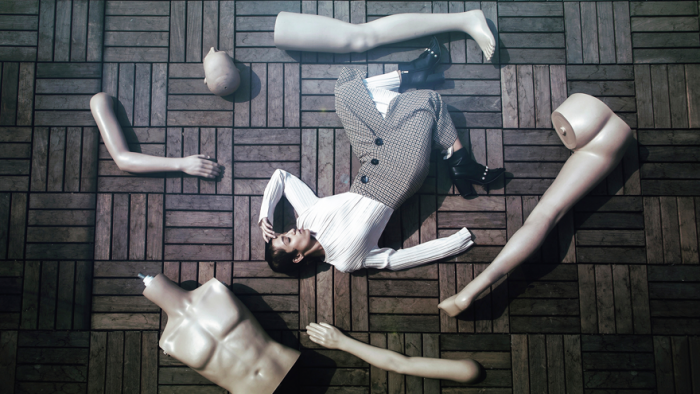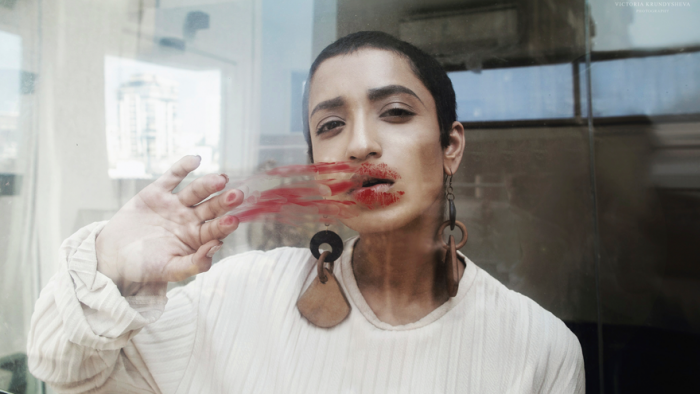Victoria Krundysheva is a conceptual photographer based in Mumbai, India. Through fiction-based pictures and an unusual take on fashion, she calls attention to major social and individual issues. In her latest collection, The Glass Walls, Krundysheva takes a critical view of the way social media has shaped our perceptions and interactions with one another in real life.
Wanting to shed light on the pitfalls of the still relatively young, yet completely dominant social platforms such as Facebook, Snapchat and Instagram, Krundysheva presents a figure who is caught willingly inside a transparent box. It is a metaphor for the windows we create around ourselves, each a portal with which we control what others see about us.
“The Glass Walls comes from the likeness of social media and the way we use it as store windows – we put only the best merchandise on display, carefully curate what we present, irrespective of whether it shows reality or, more likely, a beautifully retouched version of our lives,” says Krundysheva. “I believe these polished displays ultimately create unrealistic expectations for people towards their own lives. We are getting caught in a cycle of unrealistic standards.”
The photographer’s intent strikes at the heart of what makes social media so popular. The attraction seems obvious: The more we learn about other people, the more we'll come to like them. The assumption underpins our deep-seated belief that all communication networks, be it the telephone system or Facebook, will help create social harmony. But Krundysheva’s artwork asks, what if the opposite is true?
“We dress ourselves up just like one of the mannequins. We let people watch, let them take our life apart piece by piece, discussing it or exploring it further with every click. The special moments we have are being judged and evaluated by criteria set outside of our emotions and experiences,” she says.
There is some evidence that supports Krundysheva’s cautionary view of the way social media dis/connects us. In a Boston Globe article, author Nicholas Carr presents evidence showing that as we get more information about other people, we tend to like them less, not more. Through a phenomenon called "dissimilarity cascades" we place greater emphasis on personal and cultural differences than on similarities, and the bias grows stronger as information accrues. This peculiarity seems to intensify online, where people are rewarded for sharing endless information about themselves. What the research indicates is that the rapid spread of social media is more likely to create social animosity than harmony.
“I want to point out that honesty seems to be the objective, yet there is always a solid wall separating us from who we share it with. Here, connections are majorly superficial. We feel that we are engaging, yet it is mostly a surface level,” explains Krundysheva. “It’s the kind of interaction that in the end makes us feel lonely still, even if the numbers show that we are very connected."
Not losing sight of the great things social media provides for noble causes around the world, Krundysheva wants folks to take note of the upsurge in wanton bullying that takes place on these platforms and think about the enabling role it plays for anyone with an internet connection.
“Social media still remains a great tool for me to get inspired and reminded that there are a lot of people in the world doing good things for others, not giving up hope. But more and more negativity is spreading around; hate towards one another, intolerance towards diversity and different points of view. I am hoping that people will be reminded of that feeling we all try to avoid – fear to let go. Polishing your life for social media devalues the experience you are living, steals from you emotionally and in the end, gives you hollow affirmations.”
Through transparent panes of glass and cold mannequin figures, Victoria Krundysheva holds a mirror up to the toxic behaviour that social media can unlock for society at large. According to her, we have entered an era of entertaining a lot of content for "immediate" rewards and are too scared to be honest when we subconsciously keep comparing our lives to the modified pictures we see online. Fortunately, she has a solution and it is one that starts with the individual and ends up benefiting the whole group.
“We have to stop demanding so much of ourselves and appreciate every good moment we have, regardless of whether it's bigger or smaller than someone else’s post.”
Credits:
Creative Director, Photographer: Victoria Krundysheva photography












